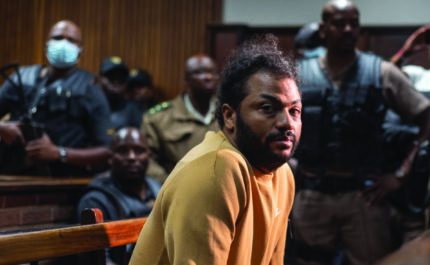The battle of ‘Cop City’
A proposed new police training centre in Atlanta has provoked bitter opposition in Georgia and opened dividing lines across the US. Some see a hard-pressed police force receiving a long-overdue facility. Others see politicians and corporations handing a gift to aggressive officers who are ineffective stewards of public safety. On 31st May, the standoff entered a new phase, ratcheting up tensions in a beleaguered and uneasy city
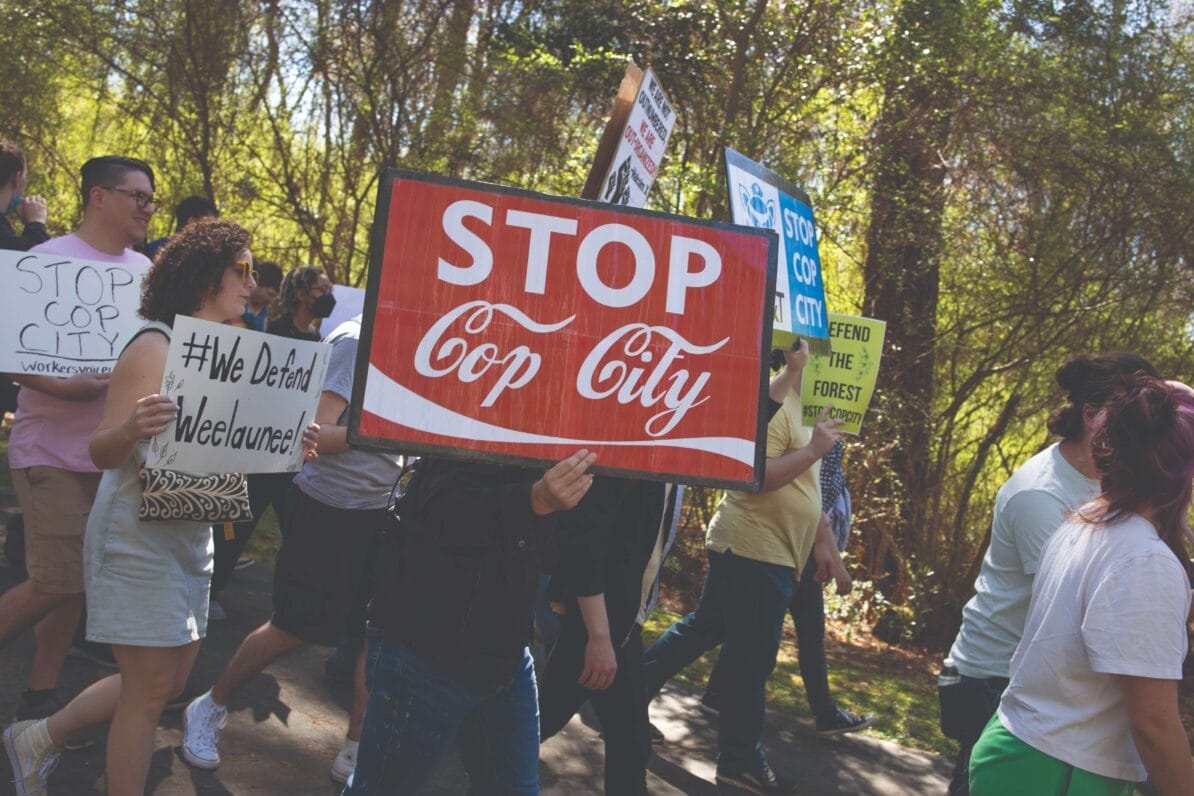
Protesters march through the South River Forest in Atlanta, a section of which is scheduled to be developed as a police training centre dubbed ‘Cop City’, 4th March 2023. Photo: Andrew Lichtenstein/Corbis via Getty Images
31st May 2023 (Taken from: #51)
As you travel around Atlanta you notice two sets of signs. The first, plastered on an inordinate number of billboards across Georgia’s capital, is for personal injury lawyers. Alternately stern and jovial attorneys with big teeth and expensive suits urge you to call their toll-free numbers and cash in on car accidents that were not your fault. A casual observer might believe the entire local economy to be based on litigating fender-benders. The other set of signs is smaller and more subtle, but once you notice its message you’ll see it everywhere, graffitied over walls, scrawled onto road signs, printed on stickers and slapped onto streetlights. ‘Stop Cop City’.
‘Cop City’, officially known as the Public Safety Training Centre (PSTC), is a new police and fire department training facility planned to be built on 85 acres of the South River Forest in the south of Atlanta. It was officially announced in March 2021 by then-mayor Keisha Lance Bottoms, in her State of the City address. Bottoms said she was “committed to working with our philanthropic and corporate partners to build a new public safety training facility for our police officers and fire department to ensure that they get top-notch training”. This inoffensive-sounding project rapidly became one of the most controversial developments in America.
“When we first heard about Cop City, it was during the last remnants of the 2020 uprising when folks were protesting against the killing of Rayshard Brooks, Breonna Taylor and George Floyd [black citizens killed by US police between March and June 2020],” says Kamau Franklin, a local lawyer, organiser and opponent of the PSTC. “When people were talking about abolishing the police, defunding the police or finding alternatives for public safety, it seemed like Atlanta decided to double down. What was immediately suspicious to us was that Atlanta has something like the 20th biggest police force in the United States, but that they were proposing the largest police training centre in the country.”
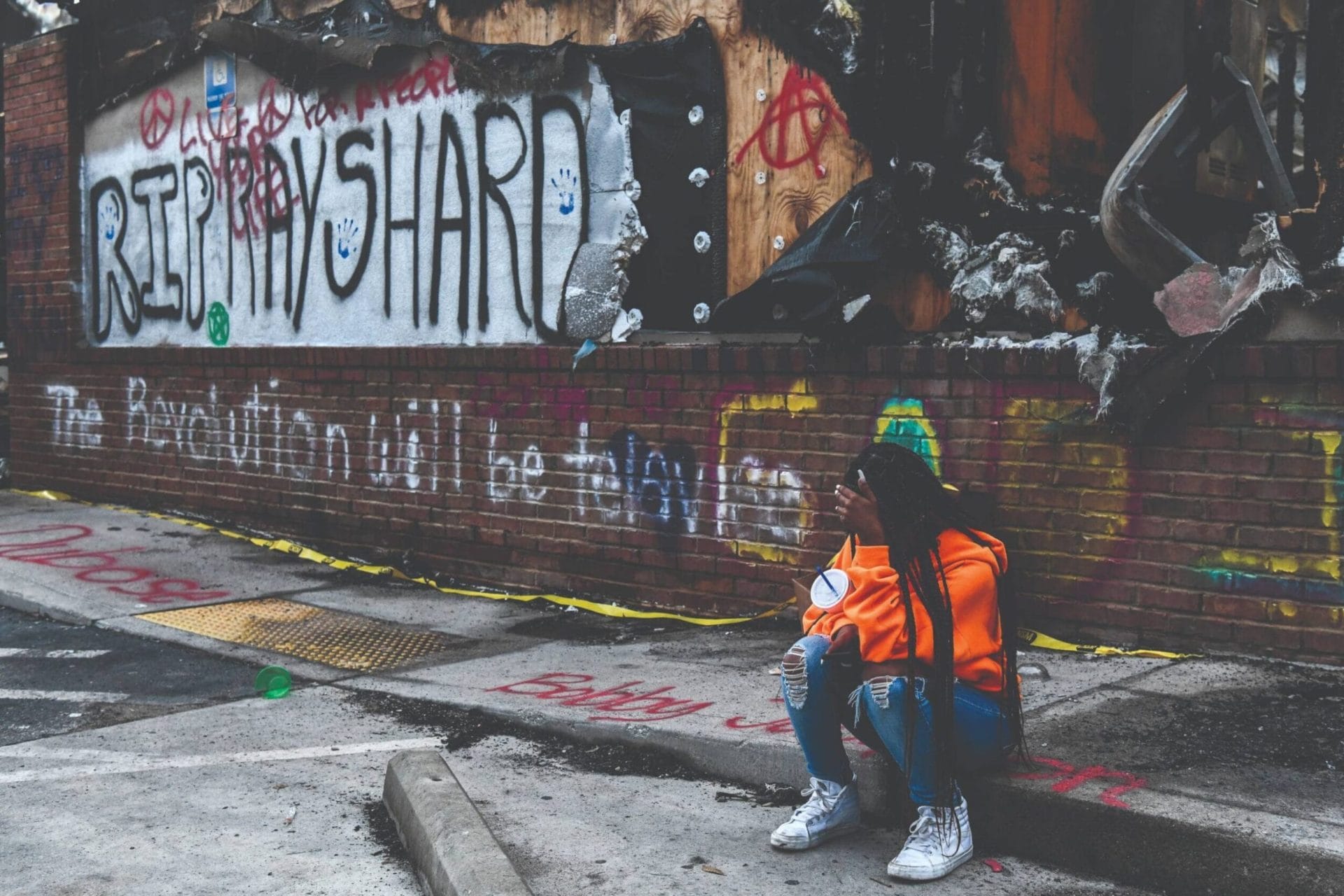
A woman sits outside a restaurant burned in protests against the shooting of Rayshard Brooks in 2020, which occurred three weeks after the killing of George Floyd in Minneapolis. Photo: Chandan Khanna/AFP via Getty Images
Opponents say the PSTC will take a chunk out of Atlanta’s largest remaining public green space, whose trees are an important part of the city’s defences against flooding. They believe the $30 million initially pledged towards the project by the city – which has since risen to $67 million – would be better used to fix antiquated local infrastructure, house some of the city’s 2,700 or so homeless people or provide better mental health care. They are worried that alongside the contribution from tax payers, a large amount of the funding for the centre – as much as $60 million – will come from the Atlanta Police Foundation, a politically influential, privately-funded organisation set up to assist the city’s police department, whose board reportedly includes executives from Home Depot, Waffle House, Delta, UPS and other major local companies. The financial set-up, says Franklin, seemed like it “embedded the needs of corporations over the needs of what people asked city resources to be spent on.”
Campaigns against the new training facility began soon after Mayor Bottoms’ State of the City address”
The biggest single anxiety, however, has been over the facilities at the centre. “In its earliest iteration, the things that we were hearing about were landing pads for Black Hawk helicopters, a dozen firing ranges and two mock cities to practise urban warfare and crowd control,” says Franklin. “For us, these elements spoke to two things. One, the ignoring of what people were actually protesting against, which was over-policing, particularly of black and brown communities. Two, that the very organisers and activists who were protesting against police violence were now seemingly to be targeted in terms of controlling mass uprisings which had swept the nation calling for police reform. And so we immediately got on the ground and started protesting.”
Atlanta, known affectionately as ‘The City in the Forest’, has the greatest tree cover of any major US metropolis. The wooded area now known as South River Forest was part of the territory of the indigenous Muscogee Creek peoples until 1830, when president Andrew Jackson signed the Indian Removal Act into law, leading the forest’s residents into a forced migration west in the notorious ‘Trail of Tears’. A slave plantation was set up on the vacated land and then, in 1920, a prison farm: its abandoned, decaying buildings, last used in 1995, can still be spotted amid the greenery that has engulfed them. It is here that ‘Cop City’ will be built.
Marches and online campaigns against the new training facility began soon after Mayor Bottoms’ State of the City address. On 8th September 2021, 1,144 people called in and registered their opinions with council members in a 17-hour virtual public comment session ahead of a vote on whether to grant the land needed for the PSTC, the Covid pandemic having put a stop to in-person feedback. Almost 70 percent of callers were against the new facility, many of whom were passionately opposed to it. Comments included: “The police do not need a brand new facility to build a fake city and learn how to brutalise the residents of Atlanta,” “More police and more training is not the answer to crime in Atlanta,” and “That land should be returned to the Muscogee.” At least one caller momentarily forgot the diplomatic niceties of the forum. “This is some fucking bullshit,” they told the assembled councillors.
By contrast, the comments in favour were more reserved. A lot of police officers called in to support the project, along with an unusually large representation of residents from one particular part of Atlanta: Buckhead.
Buckhead, an area stretching north from the centre of Atlanta, is the wealthiest part of the city. Annexed into Atlanta in 1952, it is home to 20 percent of residents, but contributes 40 percent of property value and tax revenue. It is the richest part of a city that has the highest income inequality in the US and the whitest section of what was, until very recently, a majority black city. And in recent years some of its residents have set off on an unusual crusade.
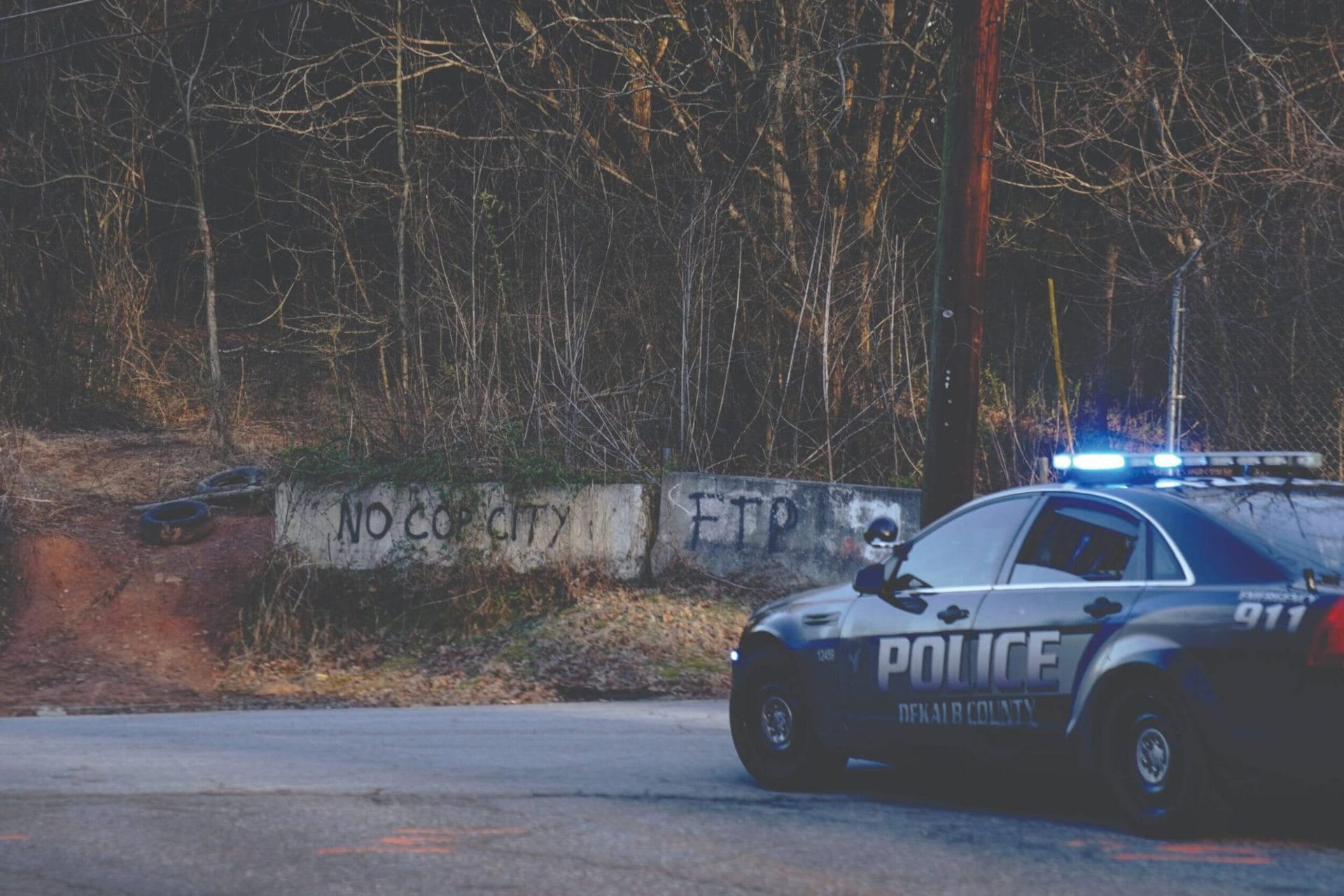
A police car drives past the planned site of the Public Safety Training Center. Photo: Megan Varner/Getty Images
“Buckhead has threatened to separate from Atlanta and to form its own city,” says Kamau Franklin. “It has done so basically because [its residents] say that there is too much crime and they need more policing support.” The Buckhead City campaign, spearheaded by self-declared entrepreneur, philanthropist, trained French chef, coastguard pilot, volunteer fireman and charity organiser Bill White, who has also been a fundraiser for Donald Trump, envisaged that Buckhead, despite being surrounded on all sides by the rest of Atlanta, would secede. It would then use its greatly increased civic funds to hike the number of police assigned to the new city from 80 to 250, while simultaneously decreasing taxes.
“Our movement is a meteor. And meteors do one of two things, they either shine brightly or they smash into something and blow it up,” said White in a campaign video. “And I think we’re going to continue to shine brightly because we’re on a mission, our mission is pure, we know it’s correct, they’ve forgotten how to keep the rule of law intact and to protect our citizens. And that is the main driving force behind Buckhead City.”
Crime rates in Atlanta have fallen significantly in most areas since 2009, with burglary, larceny, car theft and aggravated assault all dramatically down overall – although some areas saw upticks in 2019-2021. Murder rates have bucked the trend, however, almost doubling between 2009 and 2022. This worrying increase has been driven in part by gangs, who account for as much as three quarters of violent crime according to Fulton County district attorney Fani Willis.
While Buckhead remains one of the safest parts of Atlanta, supporters of secession were able to highlight an increase in robberies in the area of 39 percent between 2020 and 2021, of theft from cars of 40 percent and of aggravated assaults of 52 percent. White and his supporters also pointed to a dwindling police presence in the wake of the Black Lives Matter movement that gripped the US after the killing of George Floyd by police officer Derek Chauvin in Minneapolis on 25th May 2020.
This movement reached its height in Atlanta after 27-year-old black Atlantan Rayshard Brooks was accosted by officers having fallen asleep in a Wendy’s drive-through on 12th June 2020. After a mainly calm 40-minute interaction with the police during which Brooks was found to be over the legal alcohol limit for driving, the officers moved to arrest him and he grabbed one of their tasers while attempting to run away. One of the officers, Garrett Rolfe, shot him in the back and he died of his wounds.
The Wendy’s was burned down by protesters the next day. Charges were brought against Rolfe on 17th June 2020, and in protest at the treatment of their fellow officer 171 of Atlanta’s beat cops skipped work, many calling in sick with ‘blue flu’ for several days. A significant number of officers went on to leave the force.
There was a panic among some sections of Atlanta society that the city would be left without effective police protection. As part of the attempt to give police a morale boost, on 18th June 2020, just five days before the funeral of Rayshard Brooks, the Atlanta Police Foundation announced that it would be giving a $500 bonus to every officer on the force. Rolfe was later reinstated to the police force and all charges against him were dropped. In October 2021, a poll was conducted showing that 73 percent of Buckhead residents said crime was their number one local concern and that 64 percent supported secession.
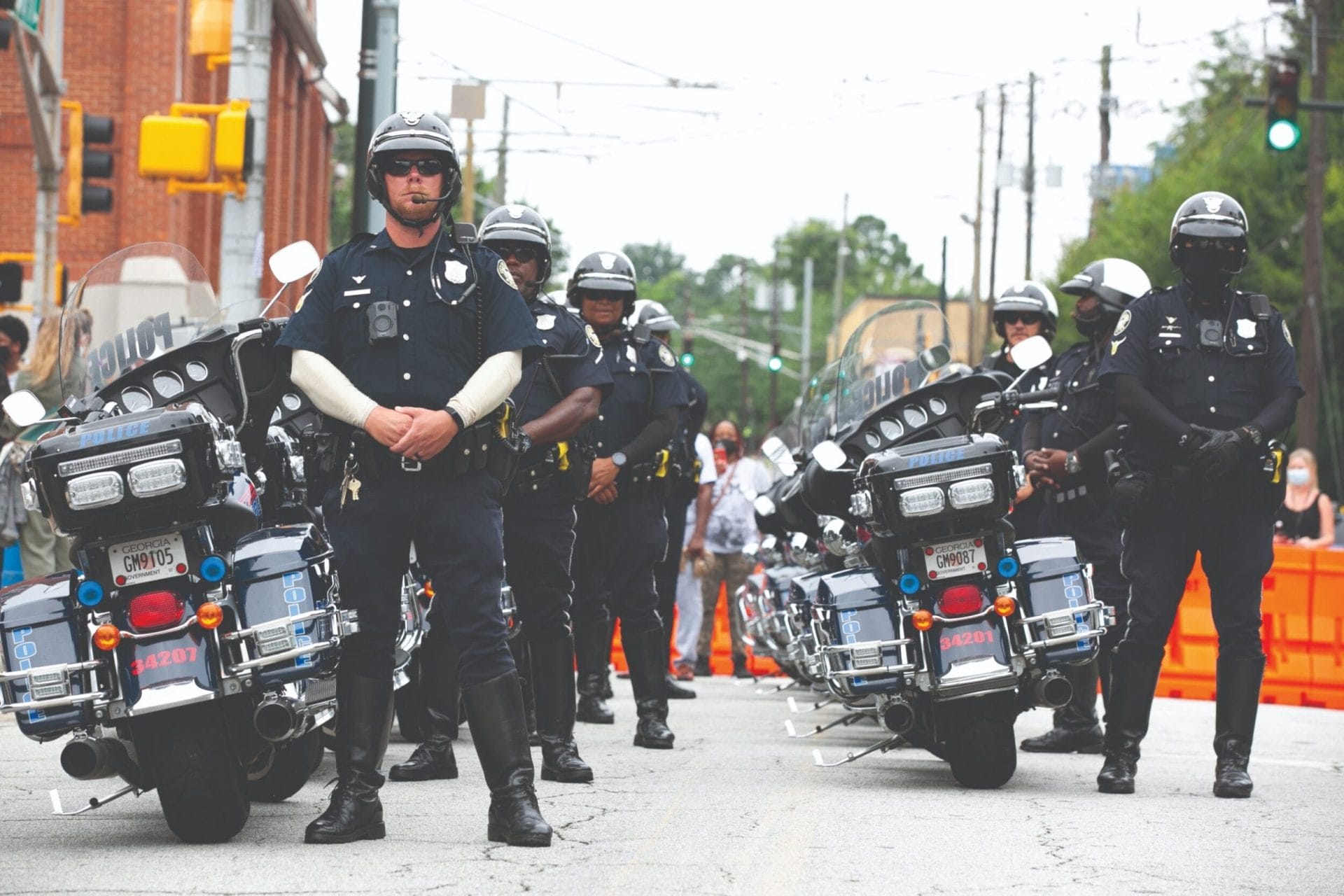
During nationwide calls to defund the police in 2020 all 2,000-plus officers in the Atlanta Police Department were given a $500 bonus. Photo: Jessica McGowan/Getty Images
Andre Dickens, who took over as Democratic mayor of Atlanta in 2022, has enthusiastically championed the creation of the PSTC. It has been suggested that part of his eagerness to push it through is to give a law and order sop to the residents of Buckhead, to encourage them not to secede from Atlanta and leave him in charge of a much-diminished city with an embarrassing gap at the top and no money to spend. Kamau Franklin believes that Georgia governor Brian Kemp, a Republican who was talked about as a potential candidate to run against Donald Trump in the presidential primaries, may also have brought pressure to bear on Dickens.
This wasn’t about a public safety training centre, this was about anarchy”
“The governor basically told the mayor, I will stifle the efforts [at cityhood for Buckhead] in the state legislature because I like what you’re doing on policing,” says Franklin. “This is now something [the governor’s team] can hold over the mayor’s head and say, ‘we will basically take away the wealth of Atlanta if you don’t do what we want you to do on policing’. This is not to say that the mayor does not already support building Cop City, but this is an extra added piece of leverage.”
After enduring 17 hours of insights from the public on 8th September 2021, Atlanta’s city councillors, including Andre Dickens, voted by ten to four to lease the land for the PSTC to the police for 50 years at a rent of $10 a year. The vote only increased the determination of the Stop Cop City protesters. “We created a coalition of organisers and organisations across the spectrum,” says Franklin. “Everything from folks who would be defined as anarchists to left wing folks, grassroots organisers and environmentalists.” A group of ‘forest defenders’ began camping out in the South River Forest, constructing barricades and conducting tree-sits in specially-built platforms to prevent the clear-cutting of the site by loggers to allow construction to begin.
Confrontations took place between police and protesters in the forest in May and December 2022. Then on 5th March 2023, construction equipment was set on fire at the PSTC site by a group of protesters wearing black masks: 23 people were arrested and charged with domestic terrorism, which carries a penalty of between five and 35 years in prison. Protest groups claimed that some of those arrested were not even part of the demonstration, but just happened to have been in the area while attending a nearby music festival.
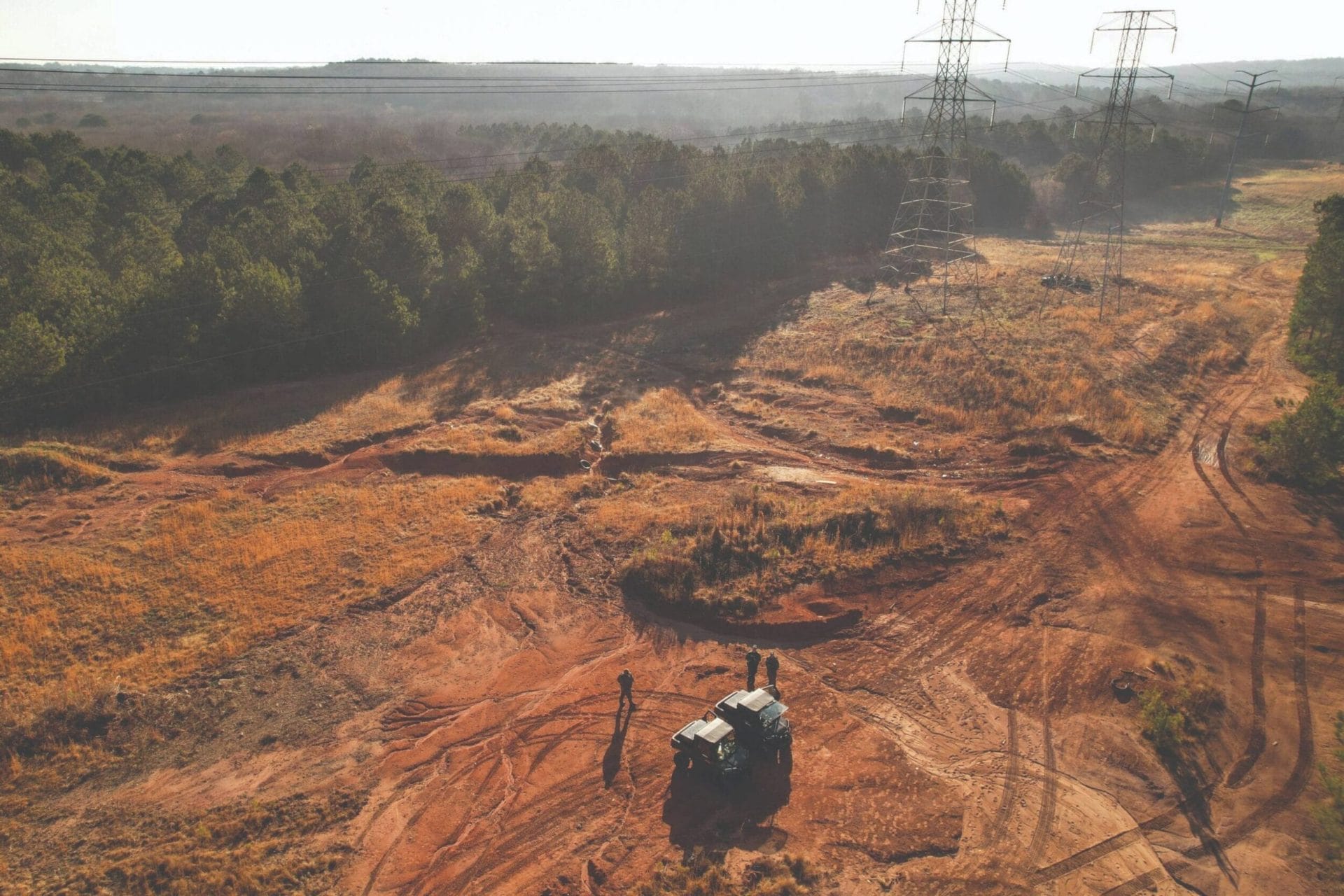
Law enforcement officials survey the planned site of the Public Safety Training Center aka ‘Cop City’, 6th February 2023. Photo: Cheney Orr/AFP via Getty Images
The cops, however, were clear about what they faced. “This was a very violent attack that occurred this evening,” said police chief Darin Schierbaum after the incident. “This wasn’t about a public safety training centre, this was about anarchy and the attempt to destabilise.”
Darin Schierbaum was a 911 coordinator with the Sheriff’s department in Johnson County, Illinois for ten years before joining Atlanta Police Department in 2002 and starting work as a beat cop in the Midtown district, where he currently lives. “When I first patrolled that neighbourhood it was overrun with drug dealers and prostitutes,” he says, adding that he has seen a positive trajectory in Atlanta over the last two decades. “I know Atlanta to be very, very safe,” he says. “And this is a great place to call home.”
Appointed as chief of police in May 2022, he was immediately thrown into the heart of the struggle over the PSTC. He believes that the centre is vitally important for the city. “Whether it’s the fire or the police department, we have to be two things constantly,” he says. “We have to be very good at what we do and we have to be trusted by the community. And very good at what you do, boy, that covers the gamut. That’s the child who is not breathing. That is an active shooter situation. It’s an Alzheimer’s patient that has wandered from home. It’s a child molestation. We get called upon daily to respond to the citizens of this city in need. And when we see our citizens are having their very worst day, we as an organisation have to be at our best… At the core of that is training. It is not the uniform that we wear that makes us trusted and good at what we do, it is a quality, groundbreaking training that is immersed in reality and repetition.”
Schierbaum says that his officers have been training in “deficient facilities” for years and denies that the PSTC will be used to train police in aggressive or militarised techniques. “The nonsense that’s out there!” he exclaims. “That we’re going to go from a department that responds to 911 calls and serves the citizens in the highest traditions of the profession [and] suddenly turn into a vehicle to target or malign or abuse any of the 245 neighbourhoods that we [serve], it’s just ridiculous.” His police department, he says, is one of only 700 of the 18,000 law enforcement agencies in the US to have been recognised by the public safety agency assessment body CALEA as one of the best in the country.
Frustrated by what it says is disinformation around the PSTC, the mayor’s office has created a website to dispel myths. It says there will be no helicopters, helipads, tanks or explosives at the PSTC, that it won’t be the largest police training facility in the country “by a long shot”, and that the ‘mock city’ will just be “four small buildings” – a house, night club, gas station and motel – to simulate real-world training. There will be only one firing range, replacing one which has been in use at the site for years, and it will have sound baffling to reduce noise.
The site also emphasises that firefighters will train at the site too, and that they have been suffering from run-down, sometimes unsafe training facilities for years. As head of Atlanta’s fire service, Rod Smith wants his staff to have the new joint training facility, and is painfully aware that while many people object to new facilities for police, almost no-one takes exception to the training of firefighters. “It’s been extremely frustrating for me on a personal level,” he tells me. “I have been working for the department for 30 years now, and we have been promised a new training centre for fire for almost 30 years.”
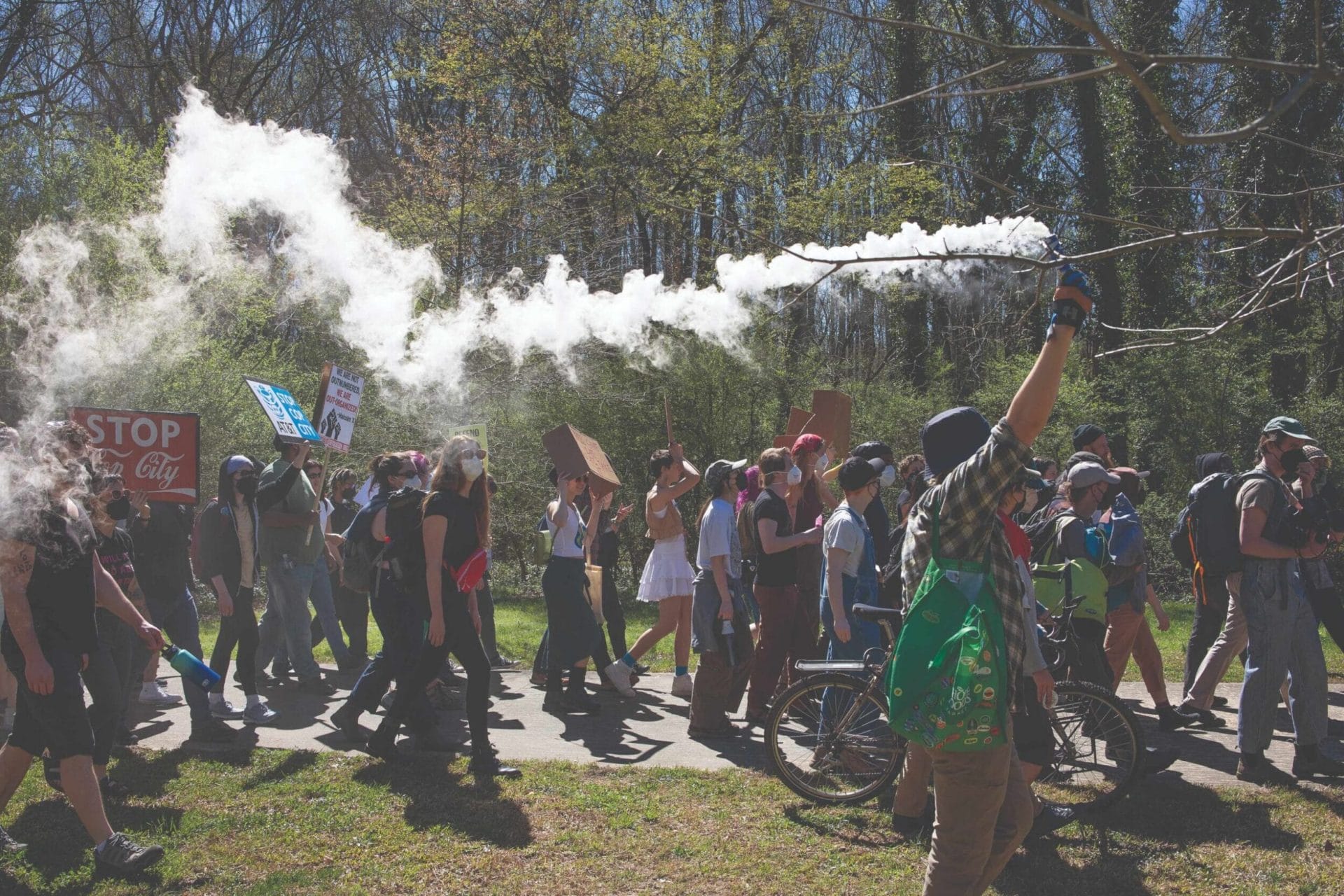
Environmental activists ‘reoccupy’ part of the South River Forest in Atlanta on 4th March 2023. Photo: Andrew Lichtenstein/Corbis via Getty Images
I ask Schierbaum about the events of 5th March 2023 at the planned site of the PSTC. The protesters, he says, “approached in military formation. They had shields. They used Molotov cocktails and fireworks and rocks to attack the officers, they overran positions. I want to give credit to our officers assigned there that day, despite the violent attack against them and while there were times when force would have been justified, they actually pulled back.”
Schierbaum says that many of the protesters were not from Atlanta. “There are certain groups… that have protested against pipelines in the United States, they have protested against police training centres in other parts of the country,” he says. “So you have individuals that are professional protesters… professional anarchists.” But it is not just the police, forest defenders, would-be secessionists and interstate anarchists that have been swept up in the churning wake of the Cop City project.
Mayson Avenue bears the marks of the rapid change that has made Atlanta the fourth-fastest gentrifying city in the US, a shift which is forcing working class families to move out of neighbourhoods they have occupied for generations. It’s lined with sleek new million-dollar homes and $100,000 cars, but traces of the old neighbourhood still remain in the dilapidated single-storey houses that testify to a less affluent past. At the top of the street there’s a smart wine bar, Vin Atl, where local oenophiles drink $19 glasses of grenache: at the bottom, an advert warns drug users that their fix could have been cut with rat poison, ammonia, embalming fluid or fentanyl, an opiate that’s a hundred times stronger than morphine.
Half way up the road is a singularly scruffy house: 80 Mayson Avenue, a squat bungalow covered with peeling paint and graffiti. “Build up resistance, tear down oppression,” is written along the porch. “Fight gentrification” is scrawled on the side. In the front garden stands a small sign: “Stop Cop City,” it reads. This is the headquarters of the Atlanta Solidarity Fund, an organisation which raises money for people who have been arrested for their involvement in protest movements and who cannot afford to post bail.
In the early morning of Wednesday 31st May 2023, armed SWAT units from the Georgia Bureau of Investigation and the Atlanta Police Department entered number 80 and arrested Marlon Kautz, Savannah Patterson and Adele Maclean, the three leaders of the Atlanta Solidarity Fund, all of whom were unarmed.
“It was terrifying,” says Kautz. “We woke up to the sound of our front door being broken down by a SWAT team… My first reaction was somewhat naively that this must be a mistake of some kind. But I realised pretty quickly that the police had come armed, ready to shoot us. They had guns pointed at us. They were discussing whether to throw a flash bang grenade into our living room when we were finally able to show we were not a threat and quickly surrender. And then we were taken to jail where we were held for most of a week.” The three have since been charged with money laundering and charitable fraud, charges they deny.
Kautz co-founded the Atlanta Solidarity Fund back in 2016. “We did so because we noticed a pattern in Atlanta… that regardless of the particulars of a given movement to address political injustice, we always saw this same obstacle that they would come up against, police and state repression, which was obstructing public engagement with politics,” he says.
“When we talk about repression, it refers to all the various ways both big and small that police, prosecutors and government officials mobilise the power that they’ve been entrusted with to interfere with people’s ability to participate in protest movements. Sometimes that means passing new laws that are hostile towards the first amendment [which protects freedom of expression and the right to peaceful assembly]. But sometimes it’s much more low level than that. Sometimes it’s just police showing up at the door of an activist and asking them intimidating questions. These minor provocations and antagonisms have a chilling effect on people’s willingness to participate in social movements.”
There’s more to participating in democracy than just voting”
The Atlanta Solidarity Fund pays bail on behalf of protesters who have been arrested and cannot afford to do so themselves, who would otherwise be vulnerable to pre-trial detention in notoriously violent local jails. When they show up for their eventual trial and the bail money is returned, it goes back into the pot. “A lot of our work is just making sure that there are resources available to people who feel threatened,” says Kautz, “so that they can feel safer, so that they can know that there’s somebody who has their back.”
He sees this is a vital part of the protection of civic life in Atlanta. “There’s more to participating in democracy than just voting,” he says. “Being able to go to the streets, being able to hold signs, attend rallies, participate in demonstrations, these are core parts of what allows our society to be free and democratic.”
The arrest warrant for Kautz and his two fellow fund leaders claims that they misled contributors to their Network for Strong Communities, the organisation through which they operate the solidarity fund, by giving money to ‘Defend the Atlanta Forest’, which it describes as “a group classified by the United States Department of Homeland Security [DHS] as Domestic Violent Extremists.” (In fact the DHS does not make such classifications). The warrant claims that they were reimbursed for payments they made for purchases in support of protesters including, in the warrant issued for Savannah Patterson, just under $7,000 over the course of almost two years spent on “gasoline, forest clean-up, totes, COVID rapid tests, media, yard signs and other miscellaneous expenses.”
The arrest provoked concern from human rights, activists and community groups. “The question I have is, why do you need to deploy a SWAT team to detain and arrest people who clearly aren’t violent?” says Erin George, director of policy at The Bail Project, a US nonprofit advocating for the elimination of bail and providing bailout assistance. “Even if law enforcement officials had determined that they needed to investigate the group’s finances, I think that they could have proceeded in a much more measured way… The arrest was a really excessive display of force, and one that I fear was used to retaliate against those who had been legally protesting the building of Cop City and to intimidate other individuals or groups that support nonviolent legal protest.”
When Kautz and his fellow defendants were brought to court for their initial bail hearing, Judge James Altman registered some scepticism about the state’s case. “I don’t find it real impressive,” he told prosecutors, going on to say that “there’s not a lot of meat on the bones of [allegations of] thousands of dollars going to illegal activities.” The three were released on bail of $15,000 each.
Kautz does not seem overly concerned about the case against him, describing it as “baseless.” He is anxious, however, about the charge of domestic terrorism being brought against protesters, not just because it seems out of proportion to many of the offences committed, but also because of the effect it has on police. “The police are telling each other, they’re telling their subordinates that the people you’re going up against are terrorists,” he says.
Somebody had been murdered. I was counting down the people it could be”
“So it’s no surprise in this context that police who are heavily armed are entering an environment prepared to shoot and kill,” he continues. “In that sense it feels like the whole situation was just set up to get somebody killed. There was an inevitability about it.”
Kautz’s fears were realised on 18th January 2023 when an armed group of officers from Georgia State Patrol, a separate law enforcement department to the Atlanta Police, entered the South River Forest and confronted protesters at the Stop Cop City camp. During the raid an officer was shot in the leg, and a non-binary 26-year-old forest defender called Manuel Esteban Paez Terán, known as ‘Tortuguita,’ was shot dead. The Georgia Bureau of Investigation (GBI) has suggested that Terán shot and wounded the trooper first. It says that there is no bodycam footage from the incident itself. However, footage shot on the fringes shows a law enforcement official speculating over their radio that the injury was caused by friendly fire (“Man… you fucked your own officer up?”).
“We heard that somebody had been murdered that day, and there was a vigil that evening,” says Atlanta-based activist Rev Matthew Johnson, who had been providing “care and support” for Tortuguita and other forest defenders since early on in the campaign. “It was still not clear who it was. So it was this very strange situation that I’ll never forget where I was seeing people and feeling relieved to see them. Because I knew that somebody had been murdered. At the same time, in the back of my head, I was counting down the people that it could possibly be. I wouldn’t wish that on my worst enemy, but they made it our reality.”
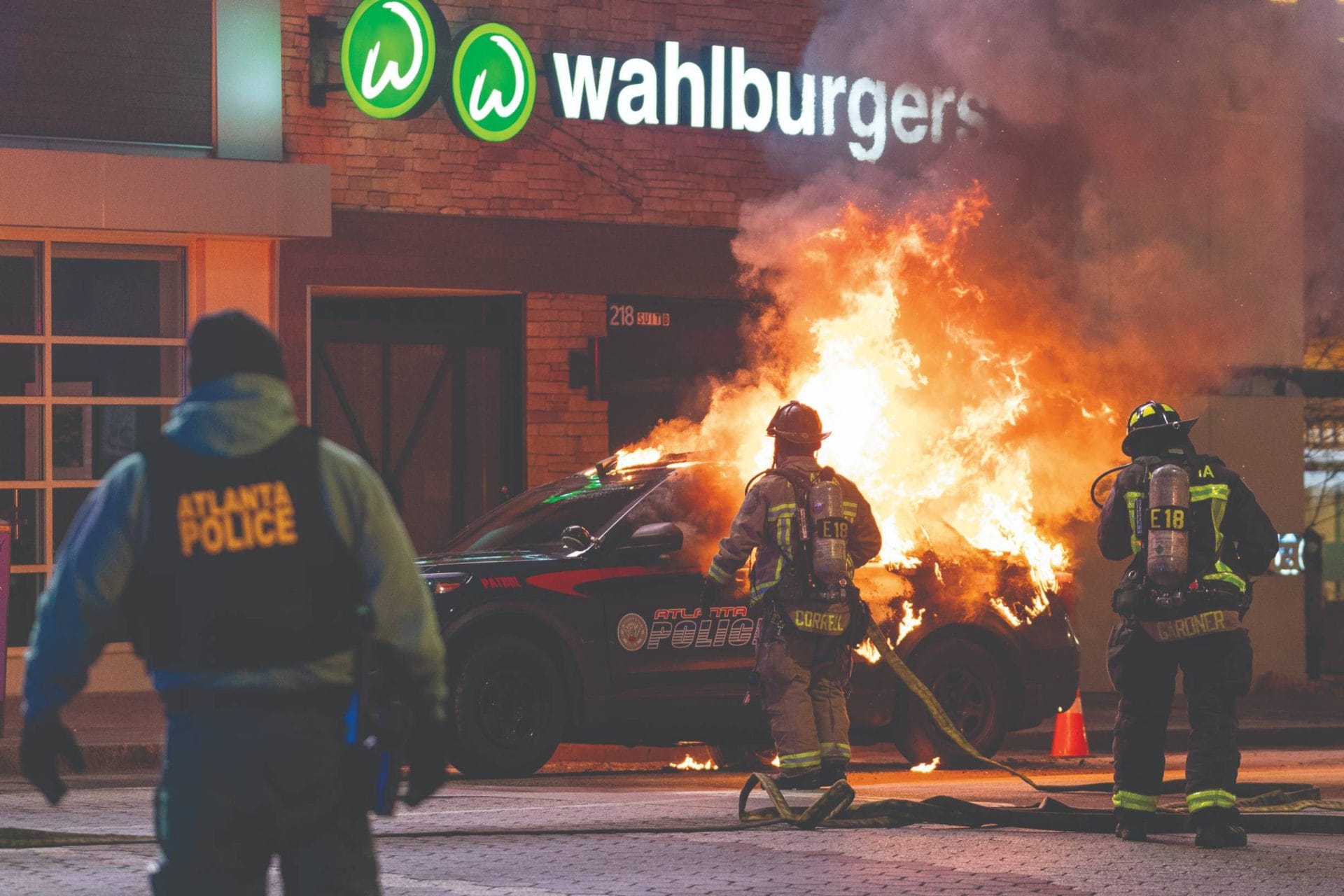
Firefighters approach a burning police vehicle during a protest on 21st January 2023, following the fatal shooting of Manuel Terán during a police raid on the site of the proposed ‘Cop City’ training facility. Photo: Elijah Nouvelage for the Washington Post via Getty Images
Johnson talks with passion about what he sees as the “American mythos around law enforcement”. “We had a record increase in the policing budget after 2020. Over the same time period, from 2019 to the end of last year, homicides in the city of Atlanta rose from 99 to 170. If we’re looking at correlation, the best that you can give me is no correlation. But if I were to look at that data it might look like the more money you spend on policing, the more murders you get… [But] it’s just taken as a given that if we invest in more police, we will be safer.”
That opinion, he says, is “a reactionary position that fails to look at the factors that are more likely to lead to criminal outcomes. More people being incarcerated and more people being in danger because of people’s desperation as they fail to have their basic needs met… Where we have seen a significant impact in our ability to keep ourselves safe is investing in affordable housing, police alternatives and diversion [people accused of a crime being put in a care or treatment programme instead of being prosecuted].”
Johnson takes exception with Schierbaum’s claim that the Stop Cop City movement has been infiltrated by professional protesters from outside the state. “This manufactured narrative was used against people in the civil rights movement,” he says. “In a modern context, these are the exact same things that Bashar al-Assad would say in Syria: these are terrorists. These are outside agitators. They’re not from here. And this justifies a crackdown.”
The significant number of ‘Cop City’ protesters arrested who are not from Atlanta, Johnson suggests, may just mean that “people that live in Atlanta are more effective at getting away because they know the lay of the land. They probably know how to evade capture better.”
As for the violence that Schierbaum says the police have received from protesters, Johnson believes the reports have been “completely blown out of proportion”. “It shifts the agency of who has proliferated violence throughout this movement,” he says. “You cannot even document one bruise that an officer has received from people that were a part of this movement. The weekend [after Manuel Terán’s death] somebody blows up a cop car at a protest. That’s a cop car on fire. And six people are charged with domestic terrorism. Yet to date, nobody has been held accountable for [Terán’s] murder.”
“My question is how much are people supposed to take?” says Johnson. “When they’re obviously not being heard, they’ve had a friend that was murdered, 42 people have been charged with domestic terrorism, they’ve been ignored by the city government and seen countless lies from law enforcement. What could I possibly tell people to say that this system is just?”
In March 2023, the Georgia Senate voted against a proposed referendum on Buckhead’s secession by 33 to 23, after Governor Kemp raised a series of objections, including a claim that the move would be unconstitutional. “In a nutshell, Governor Kemp and his team coordinated behind closed doors to kill the Buckhead City bills before they even had the chance for an honest vote in the Senate,” said the Buckhead City Committee. A few weeks later Bill White departed Atlanta, telling the Atlanta Journal Constitution that he and his husband “have to leave for our own well being and fiscal sanity.”
In April 2023, an autopsy conducted by the DeKalb County medical examiner’s office showed that Manuel Terán’s body had sustained “at least 57 gunshot wounds” and that there was no identifiable gunpowder residue on Terán’s hands, suggesting that Terán did not shoot at troopers as claimed. However, further tests by the GBI contradicted this, saying that there were indeed “particles characteristic of gunshot primer residue” on Terán’s hands. Meanwhile, a private autopsy conducted by the family said that Terán’s hands were up in the air at the time of the incident.
Many of the 42 ‘Cop City’ protesters who have been arrested on charges of domestic terrorism to date now live a half life while awaiting trial: several have lost jobs and some have launched crowdfunding appeals to help them to get by. A group of 34 civil liberties groups including Human Rights Watch have called for the charges against them to be dropped, calling them “spurious” and saying that they “represent a political decision divorced from any salient public safety concern.”
We know that there are future fights… against policing… against officials”
On 23rd June, DeKalb County district attorney Sherry Boston said that her office would be withdrawing from the prosecution of all cases relating to the PSTC, including that of Marlon Kautz, leaving Georgia’s attorney general’s office to handle the cases. She cited “a fundamental difference in prosecutorial philosophy” with the state-level legal authority.
On 15th August 2023, Stop Cop City activists announced that they had secured 80,000 signatures on a referendum demanding the cancellation of the PSTC, more than the 70,000 needed to get the poll added to the ballot in November 2023’s municipal elections. In an environment of escalating paranoia, Marlon Kautz says that the Atlanta Solidarity Fund has been fielding inquiries from the public and activists asking whether signing a petition in favour of a referendum could make them a legal target.
Already, says Franklin, the groups that have come together to ‘Stop Cop City’ are uniting to battle a proposal launched in August 2023 for a new $1.7 billion jail for Atlanta. “We know that there are future fights, not just against additional policing apparatus but also against those elected officials who have clearly landed on the side of developers, on the side of the corporations, on the side of right wing Republicans over working class and poor black people in Atlanta. We will go after those folks,” he says. The fires ignited by ‘Cop City’ will not readily be extinguished.
Slow Journalism in your inbox, plus infographics, offers and more: sign up for the free DG newsletter. Sign me up
Thanks for signing up.


